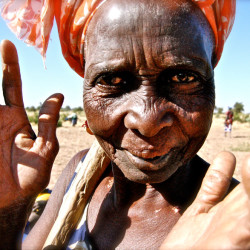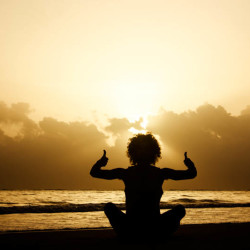To make a point in an online discussion recently (something I do much too much of, I’m working on it, but I digress) I had to distinguish between the term “expat” and “immigrant.” I did this for the opposite reason most people make the distinction and it occurred to me that this was an issue that was blog worthy.
Social footprints
It’s become very important to me in my travels to minimize by social footprint. Being green is great, and I do my best to minimize my carbon footprint, but what disgusts me more than wasted gas while I’m traveling is the other destructive aspect of travel, cultural destruction, or worst, neocolonialism (which to me sounds way too nice and should actually be called something like “modern slavery on foreign soil,” but I digress yet again)
While there was a time that travel to foreign lands was seen as brave and adventurous by the majority of the population, increasingly in recent years travel has become something a lot more accessible to a growing portion of people with the means to explore the world. Since the days of the European colonization, if not before, numerous books and movies have come out showing us that indigenous people aren’t all cannibals, and in fact one can derive great pleasure from traveling the world. Airfare has become increasingly cheaper (despite the rising cost of gas, go figure) and the term “wanderlust” has made travel something for a lot of us to aspire to, and, often, people with lifestyles such as mine are referred to as “living the dream”
Those of us stuck at home enslaved by “the man” can only dream to be as cool as me. It’s something unattainable to them. Wait, or is it?!
Jules Vernes Ethnocentricism, no Adventure
With the adventurous leg work of our “first pioneers” way back behind us, the notion of leaving it all behind for a better life elsewhere is becoming more commonplace. As the “developing” world supposedly “cleans up its act” and becomes “less violent” it seems all the worries of traveling are gone and the only thing left is the humongous benefit of living out your life on a small percent of what it would cost at home, and the lawless freedom of countries with [visibly] corrupt governments.
More and more of us with pensions, savings, or some sort of portable income are turning to countries with a lower GDP to get out of the rat race, myself included.
The Real issue with the term expat.
So what’s an immigrant? and what’s an expat? and what’s the difference? and who cares?
The word immigrant comes with a negative connotation, not as negative as a migrant, but definitely more so than an expat. Sure, Americans are all proud of their immigrant heritage, yet the majority now would prefer to close the borders to any other immigrants. The way society defines these terms, off the record of course, goes a little like this:
- Migrants are very poor. They’re usually illegal. They’re vermin here to steal jobs and should be rounded up and deported.
- Immigrants are not as poor but still poor. They’re usually of legal status though, so we can’t kick them out. They’re in search of a better life and we’ll let them have the jobs we don’t want. It’s not charity it’s just trickle down economics.
- Expats aren’t poor. No one seems concerned about their legal status, they have enough money to support themselves, so they’re valued and we’ll let the legality of it all slide.
There’s another racial undertone here where it’s generally easier to assume someone visibly ethnic is an F.O.B. immigrant vs. someone who’s not. But that’s a post all to itself.
We’re not better, but we have more cash.
Basically it’s all about perceived value for the country. “You’re rich, please, come in, spend your dollars!” vs. “You bring with you the plague of poverty and delinquency, please go back to where you came from”
The whole thing boils down to money is power and power is responsibility.
Some people have written about the questionable political correctness of using the term “expat” rather than “immigrant” to describe yourself, pointing out that it comes with an air of arrogance.
While that’s true, I personally feel the real issue is in denying there is a difference between an expat and an immigrant and calling yourself an immigrant when you are in fact an expat.
To deny that there is a difference between someone escaping the hardships of their life in a “developing” country in search of a better life in “developed” countries versus someone who chooses to go to a country with a lower GDP willingly, for whatever reason, is to deny a very clear hierarchy of privilege. It’s to rob the immigrants of their struggle and to excuse the expats from their responsibility.
Our responsibilities
What are some examples of this socio-economic, nationalistic gap?
First off it’s incredibly difficult, and growing harder every day, for someone from, say, the Dominican Republic, to get a tourist visa to just about anywhere, whereas if you’re from Canada, you’re welcome most anywhere without a visa and are actually legally allowed to work in most of the commonwealth.
Don’t believe me. Take a visual tool. Visit visamapper.com and flip through some of the countries out there to see just how inaccessible the world still is today to the majority of humans living on it.
As a personal anecdote, when traveling Nicaragua and building a guitar with a local luthier, I started realizing it was easier for me to travel the country than a local, locals often being denied access to hostels and hotels, and not making enough money to spend on the luxury of tourism. One of the luthier’s aids was fascinated by my stories and pictures and reality slapped me hard across the face when I asked him “if you could travel anywhere, where would you go?” and he answered: “wherever I can get a visa” before I’d even finished my sentence.
Most of us use the excuse of not having the time or the money to travel. As a younger more naive traveler it’d never occurred to me that some people, by “virtue” of their birth state, just couldn’t travel. Period.
As a tourist to “developing” nations, you very often get to experience a lot more of the country than its nationals, and definitely more of the world.
[Tweet “Our responsibility is to be sensitive to the double standard of immigration laws and border control.”]
Then there’s the lifestyles of the rich and famous. Television worldwide tells us that happiness comes with dollar bills and looks like a pool party with a stocked up bar and bikini clad hotties. Fact or not, it’s reinforced for locals who only ever get to see us do exactly that.
I get it. We worked our butt off all year round to afford this one week vacation, the really, really necessary break from winter’s bleak frostbitten fingers, and we really aren’t going to let it be ruined because we might or might not be changing a local’s concept of what to strive for in life.
What we fail to see is that our one week is their daily life. They see foreigners spending big bills day after day after day, because let’s admit it, when on vacation, we’re going to enjoy ourselves. What they don’t see is that it took 51 weeks of struggle for this one week of binging and debauchery. Not to mention that we might look happy in our sun-and-booze induced stupor, but for most of us, the high is short lived.
This, among other factors, has a severe effect on local culture, modifying family values, the relationship to materialism, and religion/moral values, all in the name of the “American Dream” which in this case is a blatant illusion.Believe it or not, some cultures don’t hold money on such a high pedestal.
[Tweet “Our responsibility is to make sure we do not oversell our culture as something it is not. “]
There’s the ease with which we have access to the country’s jobs, beyond the ease with which we can enter. Where we are so quick to close the borders to our nations for fear we will “lose jobs” most migrant workers are condemned to hard labour, and immigrants are allotted blue collar jobs. Expats are skilled workers. Even if we’re bartending, it’s at a tourist bar where our English is an asset. Mostly though we are here for white collar jobs such as real estate, business ownership, management, retail, some sort of portable income, or “aid” work. In any case, we wouldn’t be caught dead doing manual labour in the “developing” world where we could do it for 5 times the pay back at home.
Sometimes these jobs are done legally, sometimes they aren’t. A few bribes here and there will get us out of any serious trouble with the law, besides, the law generally regards this behavior as creating jobs and often just turns a blind eye. There are ways to conduct business that neither robs local opportunity nor creates exploitative environments where locals actually have a chance for advancement and aren’t condemned to low paying wages.
[Tweet “Our responsibility is to make sure our foreign work is done legally and doesn’t marginalize locals”]
Lastly, there’s the white savior complex. When immigrants come to our countries, they must go through an education process about our cultures and how to assimilate. They have to learn our language and our values and are expected to relinquish their conflicting values for ours. They come to integrate into our culture, not to change it. When expats go to the “developing” world, however, it seems almost expected to “give back” while there, no matter how short the stay, as if the country isn’t good enough as-is.
This might seem altruistic and good-hearted on the surface, but it can actually be more destructive than helpful. Going to a country to change it to fit our ideals of what it should be when we haven’t yet understood the subtleties of its cultures (or even experienced its culture shocks) tells locals that we’re better than they are, they’re “developing” and they can’t fully develop without our help, not to mention some of the more logistical and immediately destructive repercussions of poorly managed “voluntourism” programs.
If we want to change the world or give back, we’re better off doing so at home, in our countless needy communities, where we’re better prepared to understand the complexity of issues, and even then, while treading carefully.
[Tweet “Our responsibility is to understand community help comes from within, not from above.”]
(And only once we’re absolutely sure said community actually needs help… and to not throw candy at children, for the love of god.)
Our responsibilities also involve:
- Understanding that we are NOT the gold that makes the world go ‘round and a country is more than well within its right to charge us for overstaying our visas.
- Educating ourselves on our home country’s foreign policies and how they do or do not exploit or otherwise affect the rest of the world.
- Realizing that if we act like walking ATMs we’ll be treated like walking ATMs.
- Being aware of gentrification and growing socioeconomic gaps which creates poverty and restricts local access to previously public land.
- Accepting that “lawlessness” sometimes works to our advantage, but can also land us in very sticky situations, and that if we accept the former we can’t cry about the latter.
- That by “developing” cultures to fit the mold of the one we left, we are recreating the very system which we escaped in which we felt enslaved by “the man,” except now we’re the man.
- Keeping our preconceptions at bay and understanding our role as a powerful guests in a foreign country, and that depending on the country we are visiting, unique responsibilities will arise and should be added to the list.
I’m not suggesting we use it as a celebration of our status, yet, to deny our privileges as an “expat” is to turn a blind eye to our social footprint and responsibility toward the countries we visit.
I carefully selected multiple related articles and blog posts which are scattered as hyperlinks throughout this post. I highly suggest you read at least a few of them.










Yes, Jade. The term expat has, by itself, a kind of glamour, to some degree. In spite of that, even being an expat with enough money, living abroad is still challenging.
Hello Rubiana, thanks for stopping by!
All changes are challenging. To be challenged and in a position of power and to struggle in a hostile environment (without the option of moving to a gated community or having the luxury of the tourist police on your side) are two completely different and incomparable situations.
I’m not trying to take away any one person’s personal struggle, but struggles need to be kept in perspective.
I’m sure this is something you can understand since it seems you work helping others immigrate to Quebec. I’m sure you’ve run across the roadblocks in place for (especially low income) families during the process, and if they were lucky enough to be accepted, after moving.
All the best to you